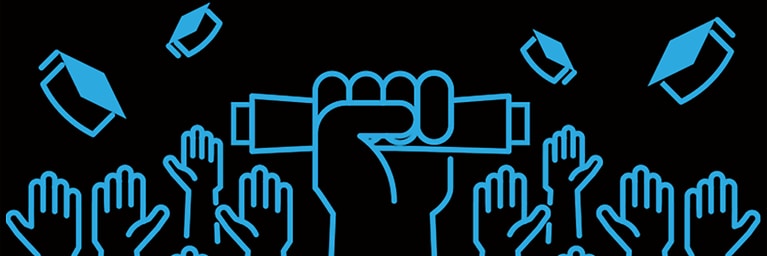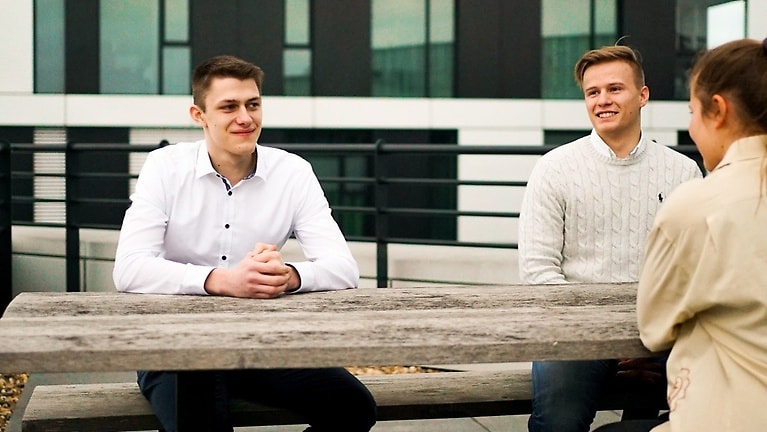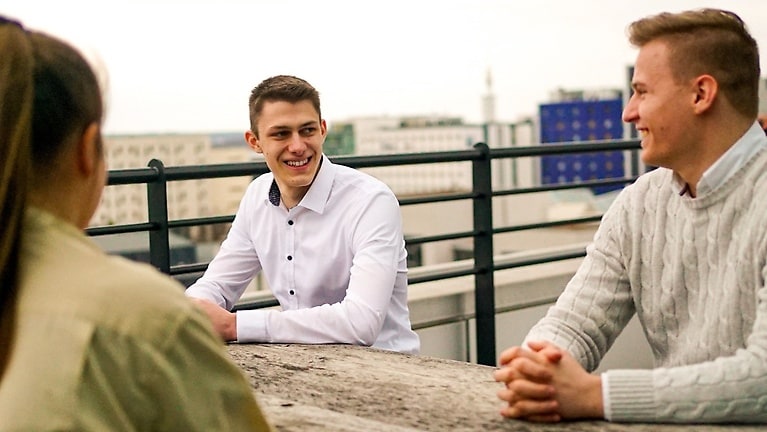
Mercedes-Benz Mobility AG
Siemensstr. 7
70469 Stuttgart
Deutschland
Tel.: +49 711 17 0
E-Mail: mobility@mercedes-benz.com
Please send queries about content on this website to any contact. You can address your concerns to us in English and your respective national language.
Represented by the Board of Management: Franz Reiner (Chairman), Jörg Lamparter, Susann Mayhead, Tolga Oktay, Peter Zieringer
Chairman of the Supervisory Board: Harald Wilhelm
Commercial Register Stuttgart, No. HRB 737788
VAT registration number: DE 81 11 20 930

Noah Engmann and Jan Wolf are dual students of business informatics at Mercedes‑Benz Mobility and Mercedes‑Benz Bank. We met them under the motto #MeetOurFuture to learn more about their studies and their work in our companies.
Jan: It was clear to me from the beginning that I would like to study a subject in which a good mix of economic and technical parts awaits me and where I can deal with innovations and the future. Since I like to work with computers, business informatics was then obvious. One of the reasons I wanted to join Mercedes-Benz was for family reasons. My grandfather already worked here, my mother then too and due to the proximity to my place of residence, the Mercedes-benz Bank was my first choice.
Noah: For me, it was a little different. Programming has always been great fun for me, so I was sure that it should go in the direction of computer science, but not only. I also wanted to incorporate an economic aspect into my studies and so I came across the business informatics course on the Internet. Since I am very interested in the Mercedes-Benz brand in my private life, I looked to see if I could also study it here in the Group, then came to Mercedes-Bank Bank and applied.
Jan: Varied. Through the two fields of economics and computer science and the six practical assignments I have, I get a wide range of topics.
Noah: Yes, we work on so many different topics and get to know them from scratch, whether these are databases or balance sheets, for example, so my word would be: miscellaneous.

Jan: In general, the course is divided into theoretical and practical blocks, each lasting about three months. At Mercedes-Benz Bank, we can apply for practical assignments ourselves and thus choose which area we would like to look into. We can apply for areas in the bank as well as at Mercedes-Benz Mobility. In addition, we write a scientific project work in the second and fourth practical assignments and, of course, the bachelor thesis at the end. There is also the possibility to go abroad, either by applying for a practical position abroad or studying in a theory block at a partner university of the DHBW. That's what I'm doing now and will therefore be studying in Seoul, South Korea for the next three months.
Noah: That's exactly how it works and what I really appreciate about the concept of Mercedes-Benz Bank is that we have the freedom to choose the practical assignments ourselves and to look into an area for other assignments not directly related to our studies, such as HR or Production.I can take so much with me for personal development and the six assignments give me a good overview of the company.
At the same time, I am involved in the youth and trainee representation here in the Group and take care of placing our concerns as trainees and being the contact person. Right at the beginning of my studies, I was chosen by the other trainees and it's really great.
Jan: Actually, nothing specific. Of course, it helps if you already have a little previous knowledge. For example, I was at a business high school and should be deleted and replaced with: However, during your studies, you will be learning everything from scratch.
Noah: Of course, an affinity for the topics and, for example, programming helps, because it is much easier to learn new programming languages, for example, if you have basically understood how they work. But even if you start your studies completely blank, you can do it. In any case, you don't need the 15 points in math, which almost nobody had in our course of study.
Jan: In principle, as with any other application, you send in the usual documents, such as CV and letter of motivation. When selected, you will do an online assessment with some group task afterwards once you pass the online assessment. After that, the decision is made and only with the position in the company you get the study place at the DHBW.
Noah: Exactly, that's how it is done in most companies and I think these tests are also more meaningful for a company than the grades, which simply depend on where you went to school and in the end do not reveal whether an applicant really fits well into the company.

Noah: Initiative, perseverance and that there is no topic that you could not learn.
Jan: I can only agree with Noah! Of course, you also learn a lot on the technical level.
Noah: After completing my bachelor's degree, I would definitely like to add a master's degree to it - of course also at the Mercedes-Benz Bank or even in the Mercedes-Benz family. I would like to focus in particular on the area of management. I simply see great growth potential there. I find it very exciting to operate at the interface between business and computer science, because there is often still a lack of understanding for the other side.
Jan: My plans are very similar. I would also like to do a master's degree and, of course, in a company of the Mercedes-Benz Group AG.
Jan: In any case, you should be aware that you are dealing with the topics of economics and computer science. So you should only choose to study if you are interested in both areas. And then also pay attention to which of the many focal points that you can choose also fits your own interests.
Noah: Yes, exactly, you should also be happy to be part of the studies and if you just don't like to do some of the content, it will be unnecessarily hard. But if you have at least a little interest in both subjects, then just apply.
Jan: Hang on. Sometimes you have to bite through, but just don't give up, because at some point it will definitely work out.
Noah: If you are worried, always let go of what is beyond your control. There are always things you don't have control over, so just focus on what you can control only. This applies to an exam, task or anything in your private life.
Jan: So we actually like to program something in our spare time and have a private project going together. But otherwise, of course, everything you like to do as a young person: Sports, meeting friends, like to cook something.
Noah: Yes, so if we don't program the nights around our ears, just everything that clears our heads a bit. I go to the gym and also like to meet up with friends.
Thank you both! We wish you continued success in your studies here and are curious to see where your path will lead. If you want to know more about our career opportunities, click here for vocational training or here for dual study.